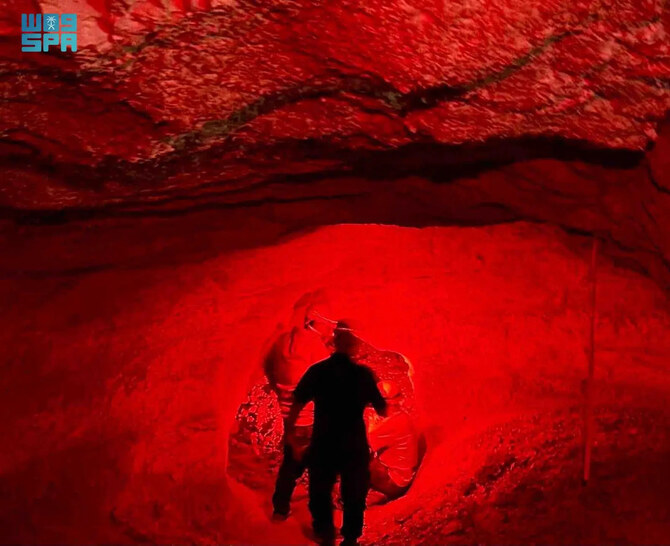Riyadh: At least 542 caves and sinkholes discovered in Saudi Arabia’s Northern Borders region offer more destinations for the increasing number of tourists, adventurers and researchers interested in these structures, the Saudi Press Agency reported on Sunday.
Of varying shapes, these structures offer a glimpse into the past with their unique geological formations, said the report, quoting Burjas Al-Falih, a speleologist and a member of the Afaq Society for Astronomy.
Among the most famous caves in the Kingdom are the Jabal Qarah in Hufuf, Dahl Heet in Riyadh city, and Shuwaimis in Hail region.

Caves and sinkholes offer a glimpse into the past, often revealing the secrets of humanity and unique geological formations. (SPA)
Saudi Arabia’s National Center for Wildlife has recently begun examining these structures in the Northern Borders region as a part of its Caves Exploration Program, which began in 2022.
According to the center, there are at least 1,826 caves in the Kingdom.
These consist of underground passages and tunnels formed by natural processes in dry limestone areas — evidence of a historical era that experienced prolonged rainy conditions.
The breathtaking rock structures often feature stalactites and stalagmites.

The rock structures, often featuring stalactites and stalagmites, create breathtaking views. (SPA)
Al-Falih emphasized the importance of documenting cave explorations. By classifying locations, types and access, adventurers can explore these sites responsibly, he said.
Organizing official trips to these locations can also help ensure their protection, he added.
In an earlier SPA report, Dr. Mohammed Ali Qurban, the chief executive officer of the NCW, explained that the discoveries in the caves hold significant environmental value for the Kingdom.
“The cave ecosystems serve as a historical museum, providing evidence of the biological diversity that has existed in the Kingdom throughout various historical eras, as well as the spatial, environmental, and climatic changes in the Arabian Peninsula,” he was quoted as saying.
He said the center’s earlier discovery of Arabian cheetah mummies in a cave — with some skeletons estimated to be over 4,000 years old — provided the first evidence of the species’ presence in the Kingdom.
Researchers from the center had also discovered rare bats and the remains of several extinct animals, he said.
The cave ecosystem is one of the rarest and most important of its kind in the world, recognized as a part of a nation’s natural heritage by UNESCO.































